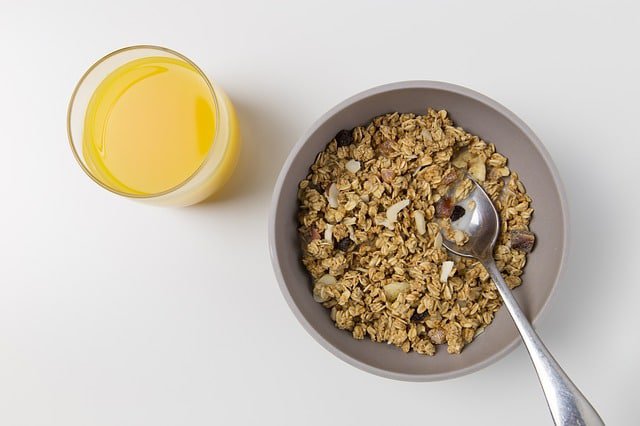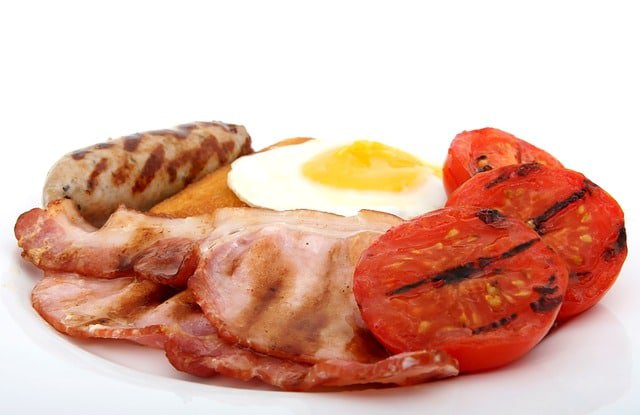5 Food Pairings to Avoid
There’s something sinister lurking in our favourite culinary pairings. Here’s how to form a mob and chase them from the village with burning torches.
There’s something sinister lurking in our favourite culinary pairings. Here’s how to form a mob and chase them from the village with burning torches. – by Kerry McCarthy
Fish and chips, sausages and mash, pancakes and maple syrup… our gastronomic world is packed with pairings we love. But some foods are not better together, reacting with each other to create a nutritional horror show. Emma Rose, head nutritionist at Fresh Fitness Food, shines a light on some of the scariest abominations to nature and offers alternatives to these nutritional nightmares.
1/ Latte and croissant

The trouble: ‘This pair is the perfect match when it comes to spiking blood insulin levels,’ says Rose. ‘The highly processed carbs are absorbed quickly and they lack fibre, so they hit your system quickly rather than supplying the slow-release energy that keeps blood sugar stable.’ The kicker, though, is the combination of simple carbs and rich fats. This results in reduced cellular energy production, causing the liver to store calories as fat rather than using them efficiently for fuel.
The fix: Black coffee and a wholegrain English muffin. This combo is lower in fat and higher in fibre, so it’s the perfect fuel for the start of a busy day. ‘The muffins provide the slow release of carbs needed to supply energy to your muscles,’ says Rose. ‘Caffeine helps to mobilise fat stores and burn them quicker,’ she adds. ‘The longer the body is using fat as its fuel, the more glycogen is spared. A delay in the depletion of glycogen can extend exercise capacity, so you can train and race harder.
2/ Baked beans and cheese
The trouble: Beans, beans, good for your heart, and so on… And it’s true, says Rose: ‘Baked beans are a fairly nutritious option, but their high levels of soluble fibre can cause flatulence. The gut bacteria break down the fibre, producing hydrogen, carbon dioxide and nitrogen as byproducts.’ Adding dairy to the mix makes matters worse, as it’s a gas-generating foodstuff, too. The effects will depend on your ability to break down lactose, something that decreases with age.
The fix: Baked beans and eggs. ‘The beans contribute an array of nutrients, including iron, which is required for energy production, as well as magnesium and potassium, which aid muscle contraction and growth,’ says Rose. Add the eggs, which not only give a protein hit, but also provide vitamin A (to boost the immune system), B vitamins (to support the nervous system), and phosphorus (strengthens bones) and you have an excellent recovery meal that can be eaten in polite company.
Make breakfast even healthier by switching out shop-bought baked beans for our homemade recipe.
3/ Breakfast cereal and orange juice

The trouble: ‘Orange juice is naturally acidic. In the first stage of digestion the enzyme ptyalin, secreted in saliva, breaks down starch into fragments that will be digested further as they move down the digestive tract. In an acidic environment the ptyalin stops working,’ says Rose. So consuming orange juice at the same time as a starch source means the first stage of digestion is halted. This means less-efficient digestion and, possibly, heartburn.
The fix: ‘Swap your orange juice for a green juice,’ says Rose. ‘As well as providing less sugar and lots of vitamins, it’s better because of where it sits on the pH scale. Orange juice has a pH of around 3.4 (below 7 is acidic), whereas green juice sits much closer to the alkaline end.’ If you don’t want to splash out at a juice bar, check the labels of shop-bought juices and choose the one with the highest proportion of veg vs fruit. As for digestion, the greener the juice, the better.
4/ Bacon and eggs

The trouble: Bacon and eggs are rich sources of protein, but the digestion time required for this protein double whammy means it’s not something to eat before a run. ‘Protein takes longer to digest than carbs or fats,’ says Rose. ‘It is a long chain of amino acids, with solid bonds holding the chain together. Breaking the bonds and absorbing the amino acids requires more energy and takes longer than it does to break down carb and fat molecules.’
The fix: Unfortunately, the bacon has to go. Replacing it with wholesome wholegrain toast will not only speed up digestion time, but also supply your running body with the slow-release carbohydrates it needs to keep you on the move. ‘Studies prove that low muscle-glycogen stores result in muscle fatigue, muscle weakness and an inability to complete long or high-intensity training sessions,’ says Rose. Eggs on toast it is, then.
5/ Pasta with tomato sauce (and cheese)
The trouble: A similar scenario to the cereal-and-juice combination. The high acidity of tomatoes prevents the efficient digestion of starch from the pasta. The addition of cheese adds further digestive strain and the meal can end up weighing you down by sitting in the stomach, because of the time and energy required to fully digest it. This is a classic prerace carb-loading option, but you can do better.
The fix: Swap the tomato sauce for pesto. Not only is pesto less acidic (so less of a digestion blocker), but it also offers other qualities. ‘Pesto’s ingredients all provide different dietary benefits,’ says Rose. ‘Basil is rich is phytochemicals, which act like antioxidants; olive oil is a heart-healthy fat that helps to lower cholesterol and stabilise blood sugars; and garlic can help prevent heart conditions, as it helps to slow atherosclerosis [hardening of the arteries].’
READ MORE ON: nutrition

